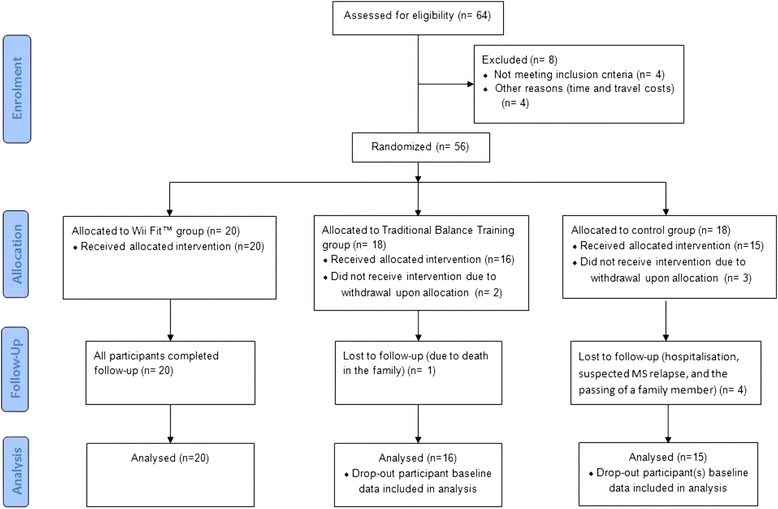The effects of exergaming on balance, gait, technology acceptance and flow experience in people with multiple sclerosis: a randomized controlled trial
- PMID: 25969739
- PMCID: PMC4427959
- DOI: 10.1186/s13102-015-0001-1
The effects of exergaming on balance, gait, technology acceptance and flow experience in people with multiple sclerosis: a randomized controlled trial
Abstract
Background: Exergaming is a promising new alternative to traditional modes of therapeutic exercise which may be preferable and more effective for people with Multiple Sclerosis (MS). Impaired balance is reported as one of the most disabling aspects of MS. The purposes of this study were to examine the effects of exergaming on: (1) postural sway, (2) gait, (3) technology acceptance and (4) flow experience in people with MS. Secondary outcomes were disability: 12-item Multiple Sclerosis Walking Scale (MSWS-12) and the World Health Organization Disability Assessment Schedule 2.0 (WHODAS 2.0) questionnaire.
Methods: Fifty-six adults (mean age = 52 years, SD = 5.8; 38 women) with a clinical diagnosis of MS and able to walk 100 meters with or without use of a walking aid were included in this study and randomized into 3 groups. Group 1 received balance training using the Nintendo Wii Fit™ (exergaming) and Group 2 undertook traditional balance training (non-exergaming). Group 3 acted as a control group, receiving no intervention. Exergaming and traditional balance training groups received four weeks of twice weekly balance-orientated exercise. Postural sway was measured using a Kistler™ force platform. Spatiotemporal parameters of gait were measured using a GAITRite™ computerised walkway. Technology acceptance and flow experience were measured using the Unified Theory of Acceptance and Use of Technology and the Flow State Scale questionnaires, respectively.
Results: There were significant improvements in bipedal postural sway in both intervention groups when compared to the control group; and no effects of either intervention on gait. There were no significant differences between the interventions in technology acceptance but on several dimensions of flow experience the Wii Fit™ was superior to traditional balance training. Both interventions showed improvements in disability compared to control.
Conclusions: In terms of the physical effects of exergaming, the Wii Fit™ is comparable to traditional balance training. These findings would support the use of the Wii Fit™ as an effective means of balance and gait training for people with MS, which is both accepted and intrinsically motivating to MS users.
Trial registration: Controlled Trials ISRCTN13924231.
Keywords: Balance training; Exergaming; Flow state experience; Gait; Multiple sclerosis; Nintendo Wii™; Technology acceptance.
Figures
References
-
- Scheinberg L, Holland N, Larocca N, Laitin P, Bennett A, Hall H. Multiple sclerosis; earning a living. N Y State J Med. 1980;80:1395–400. - PubMed
-
- Stokes M. Physical management in neurological rehabilitation. 2. London: Elsevier Health Sciences; 2004.
LinkOut - more resources
Full Text Sources
Other Literature Sources
Medical


